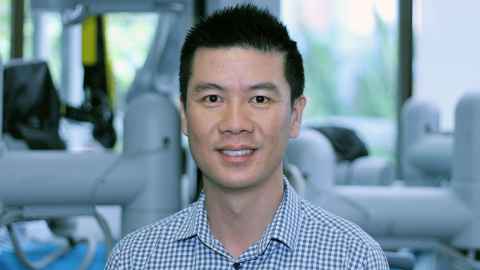Funding boost to help us understand how and why diabetes affects the heart
2 November 2020
Cardiovascular complications are the leading cause of death in people with type 2 diabetes, and researchers at the Auckland Bioengineering Institute (ABI) have been awarded funding to continue their research that aims to find out why.

Dr Toan Pham has been awarded a three-year National Heart Foundation Research Fellowship, worth $255,000, which will allow him to continue his experimental work on uncovering the sources of energetic dysfunction in type 2 diabetes.
Also, Dr Kenneth Tran has been awarded almost $600,000 from the Health Research Council’s Sir Charles Hercus Health Research Fellowship, which will allow him to develop and apply his modelling and measurement tools to understand the same problem.
The heart is complicated, comprised of billions of cardiac muscle cells which coordinate their contractions to pump blood around the body, but which can be severely affected by type 2 diabetes.
More than 90 percent of diabetic sufferers in New Zealand have type 2 diabetes, with Māori and Pacific Island cohorts being three times more likely to develop the disease.
Diabetic heart failure is a chronic condition that manifests in a diminished capacity to pump blood around the body, but despite many decades of research the underlying cause for the weakening of the diabetic heart is not well-understood.
Using a patient-specific data-driven mathematical modelling approach, Dr Tran and his team will explore how a decline in the ability of the heart to supply and efficiently use energy leads to diabetic heart failure. “At the moment, we are unsure as to why the heart suffers in diabetic patients, which makes it difficult to design effective treatment strategies,” says Dr Tran.
We need to understand the diabetic heart from the organ level down to the tissue and cell levels to generate a deeper knowledge of the problems underlying heart failure
This is the third time the ABI has been awarded the Sir Charles Hercus Health Research Fellowship in the last two years. Dr Hayley Reynolds of the ABI received the award last year, which she is using to develop advanced software tools and imaging biomarkers to enable precision treatment of melanoma, breast cancer and prostate cancer.
Dr Tran is collaborating with Dr June-Chiew Han, who was awarded $600,000 last year by the Hercus Fellowship to investigate the vulnerability of the female heart to heart disease.
Diabetic women have twice the rate of dying from heart complications compared with diabetic men. Dr Han’s hypothesis is that the diabetic female heart has more severe disturbance in energy metabolism and efficiency.
He is investigating this by using small heart muscle tissues of radial dimensions about the size of a human hair and about 3 mm long. His investigation also includes functional and structural study at the whole heart level and at the cellular level.
A range of innovative and unique instruments have been developed by the ABI over two decades, that allows researchers to studying the mechanical, ionic and energetic properties of living heart muscles and to interpret muscle function across multiple scales.
“We need to understand the diabetic heart from the organ level down to the tissue and cell levels to generate a deeper knowledge of the problems underlying heart failure,” says Dr Han.
This research funding recognises and draws together years of heart research done at the ABI, says Professor Andrew Taberner, who leads the Bioinstrumentation Laboratory at the ABI.
“This research funding is a recognition of what we can learn using the innovative technologies we have developed over 20 years at the ABI, which reveal much about heart behaviour from a sample of heart muscle not bigger than a human hair.
“This is helping us find a way to understand cardiovascular disease among people with type 2 diabetes which we hope will eventually lead to better treatment of it.”
Media contact
Margo White I Media adviser
DDI 09 923 5504
Mob 021 926 408
Email margo.white@auckland.ac.nz